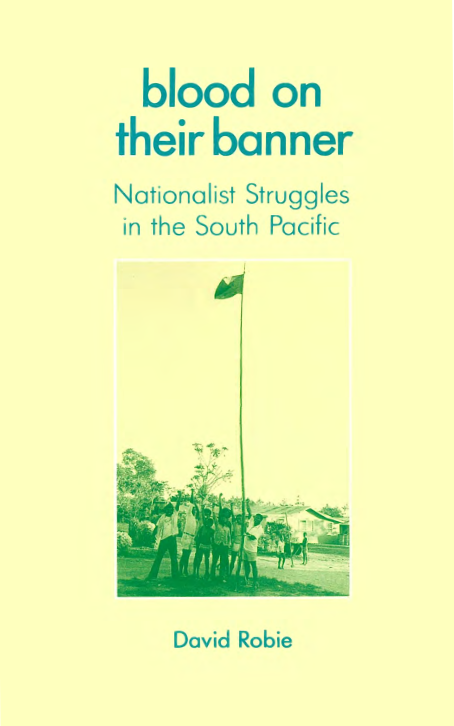A decade-old vendetta against a New Zealand journalist by a Fiji-based media group has again resurfaced.
By Harry Stoner
In mid-1989, the New Zealand Journalist branded as a ‘personal vendetta’ a series of attacks by a group of Fiji-based journalists against New Zealand author and journalism educator David Robie. Later that year, an internationally published book by Robie, Blood on their Banner: Nationalist Struggles in the South Pacific, raised questions in a section entitled ‘A compromised media’. Now that Robie has been appointed to head the journalism programme at the University of the South Pacific in Fiji, five unsigned attacks have been published in the Fiji Daily Post and Sunday Post. They were the subject of a formal ethics complaint filed with the Fiji News Council in April 1998. The Daily Post publicly apologised to Robie in November 1998.
ROBIE TARGET OF VENDETTA
Two Suva-based magazines are having an unseemly spat in which an entire edition of one publication, printed and bound, was recalled from the brink of distribution to avoid legal action from a rival.
At the centre of this bitter row is freelance Pacific affairs writer (and New Zealand Journalists’ Union member) David Robie, who dared to criticise a publication he once wrote for and was then the object of a lengthy personal attack in one of its following issues.
It is a story of press freedom, the tensions between journalists and publishers, and the politics of reporting a part of the world that is increasingly divided and volatile.
The March 1989 edition of the magazine Pacific Islands Monthly went to press with an unprecedented editorial directly attacking its rival Islands Business. The leader accused IB of demeaning the standard of journalism in the region and using invective and distortion in a personal vendetta against Robie.

Robie, 43, has edited newspapers in Australia and South Africa, and wrote for Agence France-Presse in Paris. He has covered Pacific affairs for New Zealand, British and Australian publications for the last decade and has written two books on the region.
Another, Blood on their Banner, on nationalist struggles in the Pacific, is due for international publication in August.
Now writing for Pacific Islands Monthly, he was formerly a correspondent with IB for eight years and during that time covered many of the region’s big stories including the 1984 insurrection in New Caledonia and the Rainbow Warrior affair.
Parted company
IB and Robie parted company in early 1988 but relations between them hit an all-time low later in the year after he wrote a feature analysing Pacific media politics (“The muzzling of the Pacific press?” New Zealand Monthly Review, December 1988) in which he described IB as a “mouthpiece” for the Rabuka regime.
The article reported how media corporations owned by Rupert Murdoch and French mogul Robert Hersant came to dominate the Pacific press, and how the Fiji coups had radically curbed press freedom.
Robie said IB eulogised military stongman Sitiveni Rabuka (the magazine made him Pacific Man of the Year, 1987), that publisher Robert Keith-Reid wrote articles many considered pro-coup propaganda and that the magazine hired an extreme right-wing columnist to cover New Caledonian affairs.
It was the hiring of David Los, a non-journalist who runs an English-language school and has since 1984 carried out a poison pen campaign against Pacific journalists he regarded as too sympathetic to Kanak nationalism in Noumea, that precipitated Robie’s split with IB.
In December 1987, IB published a long and vitriolic letter from Los attacking Robie, then one of the magazine’s senior writers, and mysteriously omitted to offer Robie a right of reply.
An apology of sorts was inserted in the next edition at the insistence of Robie’s lawyer but the magazine then engaged Los as a New Caledonian correspondent. Known to have close links with the local anti-independence ultra-right, Los’s contributions are generally sarcastic tirades against the Kanak independence movement which he is fond of describing as “terrorist”.
Robie resigned soon after and began writing for the rival, Murdoch-owned PIM.
He alleges IB has continued to to publish his material and photographs in breach of copyright, that the magazine owes him more than F$3000, and that it has failed to return him more than 70 photographs it holds on file. These allegations were the target of IB’s successful legal threat and were subsequently removed from the PIM editorial.
Filed legal action
On the same day Robie filed legal action seeking payment and return of the photographs.

But the dispute flared again when Robie’s article on the muzzling of the Pacific press was published. IB reproduced the article in its January 1989 edition, in breach of copyright, and interspersed three opinion pieces devoted to criticising Robie: by IB publisher Robert Keith-Reid, editor Peter Lomas, and columnist David Los. In all, the spread took five pages.
Keith-Reid alleged Robie was anti-American, anti-French, anti-Fiji coup, and had waged a campaign against IB. In reply to Robie’s allegation that the magazine was a mouthpiece for Rabuka, Keith-Reid wrote that “Except for four days’ imprisonment and some subsequent harassment and threats experienced by the publisher, there has been absolutely no attempt by authorities in Fiji to censor or interfere with the publication of this magazine.”
Lomas questioned Robie’s integrity, accused him of being blinkered, and insinuated he could not translate French. Robie lived and worked in France and covered French Pacific affairs for several years.
Los concluded his contribution with this extraordinary threat: “May I suggest that Robie’s little game has gone too far and that a legal process has been set in motion in Noumea that may give him a chance to see the inside of a prison if he cares to set foot in New Caledonia again.”
PIM responded to this attack on one of its writers, protesting in a full-page editorial that “the pages and editorial resources of an established production should be abused in a personal vendetta which, to be frank, fails to address (Robie’s) criticism.”
PIM called IB’s “profile” on Robie a “sad and embarrassing reflection on Pacific journalism” and said that it would continue to publish Robie’s work.
‘Best correspondent’
John Richardson, who was editor of IB from 1983 to 1987, also protested that “attack” on Robie, saying as far as he was concerned Robie was the magazine’s “best correspondent by far and the only one prepared to cover difficult and dangerous stories”.
He disagreed that Robie was a “leftist”, as had been alleged. Robie, he wrote, was in fact “a liberal with no political affiliations whatsoever. What he does possess, however, is a sharp awareness of what is unjust. This is vital to any journalist worth his salt.
Robie himself said it was scandalous that IB could “wage a malicious vendetta like this against a journalist and then gag a rival magazine from trying to expose the truth in an editorial”.
He said it was distasteful when a journalist had to resort to legal remedies but “the degree of malice shown by IB, towards me has left me no choice”. Robie is believed to be filing a defamation action against IB.
“The bizarre events of the last few months just endorse the theme of my article about the threats to press freedom in the Pacific.”
- This article was first published in the New Zealand Journalist in April 1989. Harry Stoner was the alter ego of Phil Twyford, then a specialist Pacific Affairs writer for the Auckland Star and president of the Auckland metropolitan branch of the NZ Journalists Union. In May 1989, Robie filed a defamation writ before the Fiji High Court seeking damages against Islands Business, Keith-Reid, Lomas and Los. It eventually lapsed because Robie was living in NZ then Papua New Guinea at the time.

